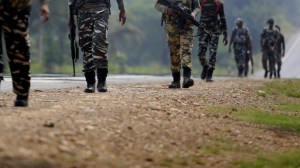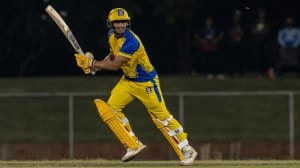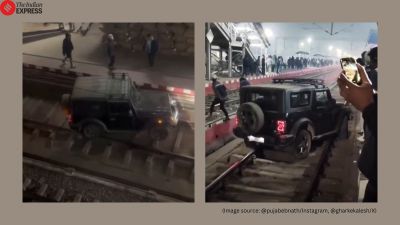The party also asked the panel’s chairperson Kovind not to allow his “persona” and the office of former President to be abused by the Union Government to “subvert the Constitution and parliamentary democracy.”

In his four-page letter addressed to Dr Nitin Chandra, secretary of the Centre’s high-level committee on ‘One Nation One Election’, Congress president Mallikarjun Kharge stressed several issues ranging from the composition of the panel and premature dissolution of the Lok Sabha to oppose the idea.
‘No substantial representation for Opposition’
Kharge said the composition of the high-level committee “seems highly biased without giving substantial representation to the opposition parties that head various state governments that would be affected by the recommendations of this committee.”
The Centre had included Congress leader in Lok Sabha Adhir Ranjan Chowdhury as a member of the panel but he had declined to be a part of the exercise saying the “terms of reference” of the committee “have been prepared in a manner to guarantee its conclusions” and calling the exercise an “eyewash”.
“When the committee is headed by no less than the former President of India, it is distressing when even common voters feel the consultations of the committee are likely to be a pretense since minds have already been made up. Firm views in support of the proposal have already been expressed in public and a dispassionate analysis of pros and cons is not being attempted in a serious and systematic manner,” Kharge said in his letter.
He recalled that Kovind, while addressing the joint session of the Parliament in 2018 as the President, had advocated for simultaneous elections saying frequent elections impede the development process.
Story continues below this ad
“Your letter also repeats the same point. We would like to submit that the development process and governance is being brought to a standstill frequently because the Prime Minister is actively involved in electioneering rather than governance,” he said. The committee had on October 18, 2023 written to all political parties seeking their views on the proposal of One Nation, One Election.
Congress unhappy with panel’s focus on ‘savings’
In its letter, the committee had said that the “advantages of simultaneous elections to Parliament and the State legislatures by way of savings in financial and human resources have long been recognized” and that “with the imposition of Model Code of Conduct during elections, development work is halted and official work other than elections virtually comes standstill.” It had also attached reports of the Law Commission India and Niti Aayog on the proposal.
Kharge said the Congress was “amused to see that your letter makes a point of saying simultaneous elections will result in financial savings.”
“The ECI had estimated the cost of conducting the 2014 Lok Sabha elections with VVPAT machines to be about Rs 3,870 crore…. The argument that the cost of conducting elections is extremely high seems baseless. Considering elections are held once in 5 years, the expenses make up less than 0.02% of the total Union budget for the preceding 5 years. When elections are held separately to the state assemblies, the cost of the election is fully borne by the respective states. The expenses for Assembly elections may also be a similar percentage of their state budgets. We feel the people will be willing to consider this small amount as the cost of free and fair elections to uphold democracy,” Kharge wrote.
Story continues below this ad
Call for transparency in funding
He claimed that the BJP has received donations of Rs 10,122 crore during 2016-2022, out of which Rs 5,271.97 crore is through anonymous electoral bonds and argued “if the committee, the government and ECI is serious about the expenditure made on elections, it would be more appropriate if they could make the funding process more transparent, especially in the matter of electoral bonds.” Such a move, Kharge said, would “truly empower the voter and increase voter awareness.”
“As per the ECI itself, a substantial part of the increase in election expenses is due to the use of VVPAT machines. We would like to point out that the ECI is not counting the VVPAT slips or corroborating the final votes with VVPAT slips as demanded by various political parties. As you are aware, these slips are unreadable within a few weeks of the results and election petitions are rendered infructuous due to lack of initiative on part of the ECI to make the results transparent,” he said.
The Congress chief said the argument that imposition of the Model Code of Conduct (MCC) hurts welfare schemes or development works is also baseless. “Pre-existing schemes and projects continue during elections and in any case, the Election Commission can always approve any disbursements of pre-existing schemes. We are shocked to see the committee in its letter misleading the people by saying all welfare schemes or development work will stop due to imposition of MCC,” Kharge said.
Story continues below this ad
The Congress also rubbished the report of the Niti Aayog.
ExplainedOpp unity to face test
“The Niti Aayog is neither a constitutional nor a statutory body and the high-level committee should not have referred to it in the first place. The committee should have applied its own mind and made its own recommendations regarding this serious and crucial issue of the terms of state assemblies… This only reinforces our concern that the committee seems to have already made up its mind and seeking a consultation seems to be an eye wash,” he said.
“The Niti Aayog maliciously interprets the Constitution to state that tenure of a state Assembly need not be 5 years and can be substantially lesser. It suggests that to meet the objectives of simultaneous elections, tenures of some state assemblies including Tamil Nadu and Kerala be curtailed by more than 2 years, and tenure of state assemblies like Uttar Pradesh and Uttarakhand be extended by more than 2 years. The Constitution nowhere authorises the Union Government to dissolve the state assemblies or to suspend the state Governments, except under the emergency clauses,” he added.
‘Betrayal of electorate’
Kharge said “dissolution of several legislative assemblies which are still halfway (or less) through their terms… would be a betrayal of the electorate in those states.”
Story continues below this ad
“If a Chief Minister loses the confidence of the house and no other party is able to form the government, the Niti Aayog report says the state should be put under President’s Rule until the fresh elections can be synchronized. This would be a travesty of democracy,” he said.
Kharge also talked about the premature dissolution of the Lok Sabha.
“Suppose simultaneous elections are held in 2024 and suppose, the central government is defeated in February 2025 and the PM calls for fresh elections. Or, suppose, on a major policy issue, the PM decides to seek a fresh mandate. Will all the state Assemblies be also dissolved and simultaneous elections held throughout the country? A state legislature is elected for 5 years. Should fresh elections be held in all states merely because the central government has been defeated or has resigned?” he said.
“There is no place for the concept of simultaneous elections in a country that has adopted a Parliamentary system of government. Such forms of simultaneous elections that are being floated by the government go against the guarantees of federalism contained in the Constitution. The government and this committee should have been honest in stating at the outset that what they are attempting goes against the basic structure of the Constitution and will require substantial changes to the basic structure of the Constitution…The Congress is strongly opposed to the very idea of one nation, one election. For the sake of maintaining a thriving and a robust democracy, it is imperative that the entire idea must be abandoned and the High Power Committee dissolved,” Kharge wrote.









